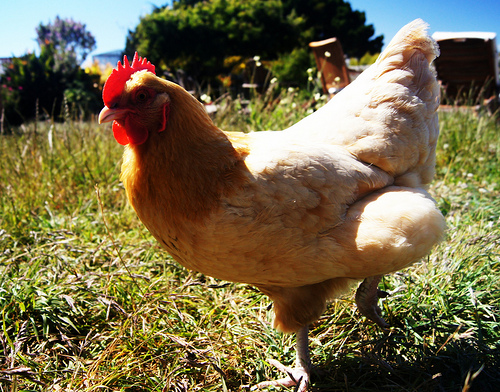 |
| Source: SMcGarnigle (flickr) |
Nicholasville’s chicken keeping ordinance has been ruled too vague and a rewrite of the law is coming.
As it stands, “the keeping of any yard or pen for … chickens … in the city in such manner as to become offensive to any person residing in the vicinity, or annoying to the public, shall constitute a nuisance and is hereby prohibited.”
OK, I can see how this may be lacking in specifics.
So, too, does Jeremy Porter. He is the programs director of Seedleaf and an organizer with CLUCK!
Lexington. Porter owns a flock of 13 hens at his home in Lexington’s Castlewood neighborhood. Through both Seedleaf and CLUCK!, he helps educate others about urban farming and creating über-local food options.
Nothing is more local than your own backyard.
That is why urban chicken keeping is a good idea — it provides fresh eggs to families and educational opportunities for sustainability for our children (and adults, too). Done right, chicken keeping can help improve neighborliness if the practice is done responsibly.
Neighborliness and responsibility. Those are two words which Porter focused on and the concepts are inseparable. Porter describes the ordinances addressing chicken keeping as being “good neighbor” ordinances.
Lexington ordinances prohibit the dying of chickens, regulate the number of baby chicks which may be sold in a transaction, and focus on the noise, odor, disturbance, and general care of fowl.
Lexington’s laws provide for the animal’s safety and health, an immediate concern for anyone who owns and cares for their pets. A well-maintained coop, appropriately sized for the number of birds, will not create odor issues. And not keeping roosters generally resolves any noise issues.
Porter believes that “if people can be good neighbors by being responsible chicken keepers, then they don’t have to worry about disturbing their neighbors.” It all sort of goes back to being a good neighbor and following the Golden Rule.
In Nicholasville, neighbors and even annoyed members of the public can complain to law enforcement under the existing chicken ordinance. Fortunately, this vague ordinance hasn’t become burdensome for those charged with enforcing it.
But as we examine a replacement scheme, we should be careful in the process. Nashville, Tenn. recently overhauled its laws establishing a series of ordinances that is too restrictive; overly complicated, their ordinances would seem ill-suite for a town of Nicholasville’s size.
Frankfort is contemplating a change to loosen its ordinances, currently viewed as being too restrictive for urban chicken keepers.
It would appear that Lexington’s set of ordinances would be a good template for Nicholasville as they establish an enforcement mechanism while allowing vibrant, healthy chicken keeping at home.
Perhaps adoption of Lexington’s system of incrementally increasing fines for violations of the chicken keeping ordinances would be appropriate for Lexington. From the perspective of Porter and other responsible urban chicken farmers, Lexington’s ordinances are very workable.
Ultimately, it is critical is that we do not eliminate the opportunity to have a backyard chicken.
The production of food at-home is a terrific educational tool for the family and community, improves our land and the environment while improving our diets and fighting obesity.
Responsible chicken farming accomplishes these goals and should not be prohibited.

This column originally appeared in the Jessamine Journal.
It should not be republished without permission.
